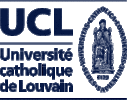Language
Language of Instruction
The language of instruction of the Erasmus Mundus Joint Master Degree QEM (EMJMD) programme is English. Therefore, all lectures, tutorials and exams are in English, as are all supporting documents such as lecture notes.
Since no course of English as a second language will be offered during the programme, the ability to attend courses in English is necessary. The Erasmus Mundus Joint Master Degree QEM (EMJMD) Application requires an English-language test certificate such as TOEFL or IELTS for applicants coming into the program. Applicants coming from an English-speaking country or having a sufficient degree taught in English are waived from this requirement.
Additional Language Courses
Each semester, to improve their linguistic abilities and cultural awareness, students are required to take courses in the local language and participate in cultural activities of the host university. Each university offers these courses at several levels (beginner, intermediate and advanced). These courses are allocated 2 ECTS credits per semester (totalling 8 ECTS credits out of the required 120 ECTS credits) and are graded either pass or fail. If they wish, students may take extra additional language courses. While the extra courses cannot contribute to the required 120 ECTS credits, they will be mentioned on the transcript.
Online Language Training
In addition to the mandatory language courses and elective courses offered by all partners, students have access to the QEM online language training in four languages of the consortium plus enhanced English. This training is free of charge (with a licence bought by the Quantitative Economics Master Programme for all enrolled students). Students can start as soon as they are accepted in the programme and continue during the their two years of studies using the same software for all languages. This allows them to prepare for their arrival in the programme (from their home country) and their different mobility tracks (from any partner).





